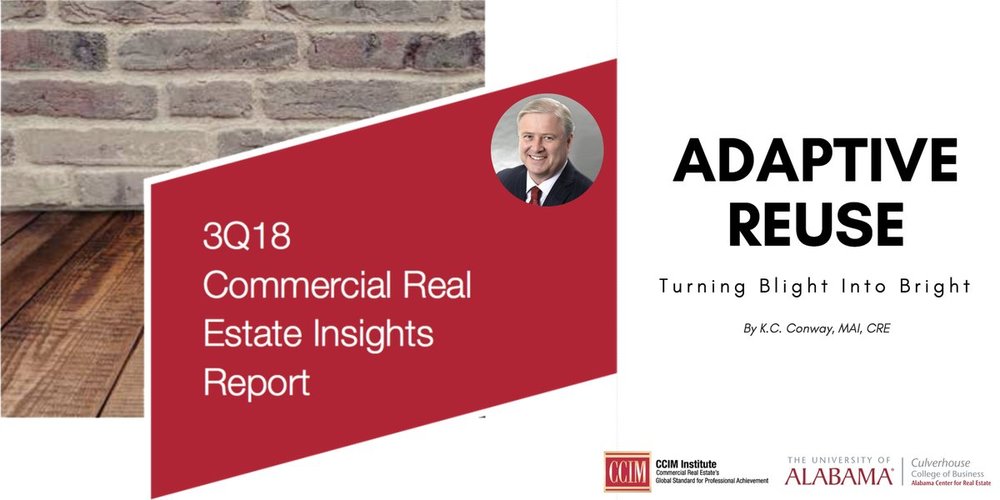CCIM Institute Chief Economist K.C. Conway, in partnership with the Alabama Center for Real Estate, released a special report entitled “Adaptive Reuse: Turning Blight into Bright,” which represents the first step to redefine and quantify the adaptation of obsolete commercial properties for new uses as an institutional-grade product category.
The special report examines the new era of adaptive reuse, which is no longer just about repurposing beautiful historic properties in primary markets to entice millennials. As the industry remains uncertain about how an extended trade war could affect the price of new construction, adaptive reuse is an attractive alternative for many developers and investors.
“We predict that adaptive reuse projects will make up a greater percentage of investment activity than self-storage and other select non-core property types by 2023,” says Conway. “But the commercial real estate industry’s understanding of this property segment isn’t keeping up with this growth. We are now helping to innovate a new data platform that will allow us to assign key indicators to the category, including dedicated vacancy and absorption numbers, as well as cap rates and IRR. This will be an important next step in raising the product type to institutional-grade and helping it to go beyond equity capital to attracting debt lenders.”
The report represents the first industry definition and detailed criteria to qualify a project as adaptive reuse, designed to serve all data capture and market metrics and analysis. In addition, the paper highlights the recent growth of adaptive reuse in secondary and tertiary markets, where commercial real estate investors see it as a driver of net operating income and yield.
The following projects and others are examined in the report: Michigan Central Station in Detroit; Liberty Hotel in Boston; Newbern Library near Birmingham, Ala.; The Crosstown Concourse in Memphis, Tenn.; the Grange Vertical Farm in Brooklyn, N.Y.; The Lucas in Boston; Los Angeles State Historic Park in Los Angeles; Stapleton Airport/Punch Bowl Social in Denver; FedEx Distribution Facility near Dallas; and the Birmingham Rotary Trail in Birmingham. In addition, the paper notes that Tucson, Ariz., is on the forefront of adopting policies to encourage adaptive reuse and may be a model for other cities looking to stimulate the local economy and put empty buildings back to productive use.
The white paper covers:
- How the lack of an industry-recognized definition and key metrics are impeding investment in adaptive reuse projects
- How adaptive reuse effectively competes with new construction, especially if we see an extended trade war
- Why widespread collaboration from local governments is critical to the continued growth of adaptive reuse as a property category
- How adaptive reuse projects can transform smaller communities, such as Newbern, Ala., and Mesquite, Texas
- How commercial real estate professionals are employing financial and market analysis approaches to maximize return on investment for adaptive reuse projects
“As I’ve had the privilege of traveling around the world on behalf of CCIM, I’ve witnessed this as a global phenomenon; from turn-of-the-century warehouses to castles to train stations, developers and investors have untapped enormous value from obsolete building stock,” says 2018 CCIM Institute President David P. Wilson, CCIM. “K.C. Conway brings a valuable perspective to this topic that sets him apart from other industry economists.”
“Now more than ever, commercial real estate professionals must make themselves indispensable to the transaction by unlocking hidden value,” says Gregory J. Fine, FASAE, CAE, Executive Vice President/Chief Executive Officer of CCIM Institute. “This report makes it clear that in the new era of adaptive reuse, the winners will be experts in forecasting demand and modeling cash flows.”
The full report can be downloaded for free at www.ccim.com/insights.





